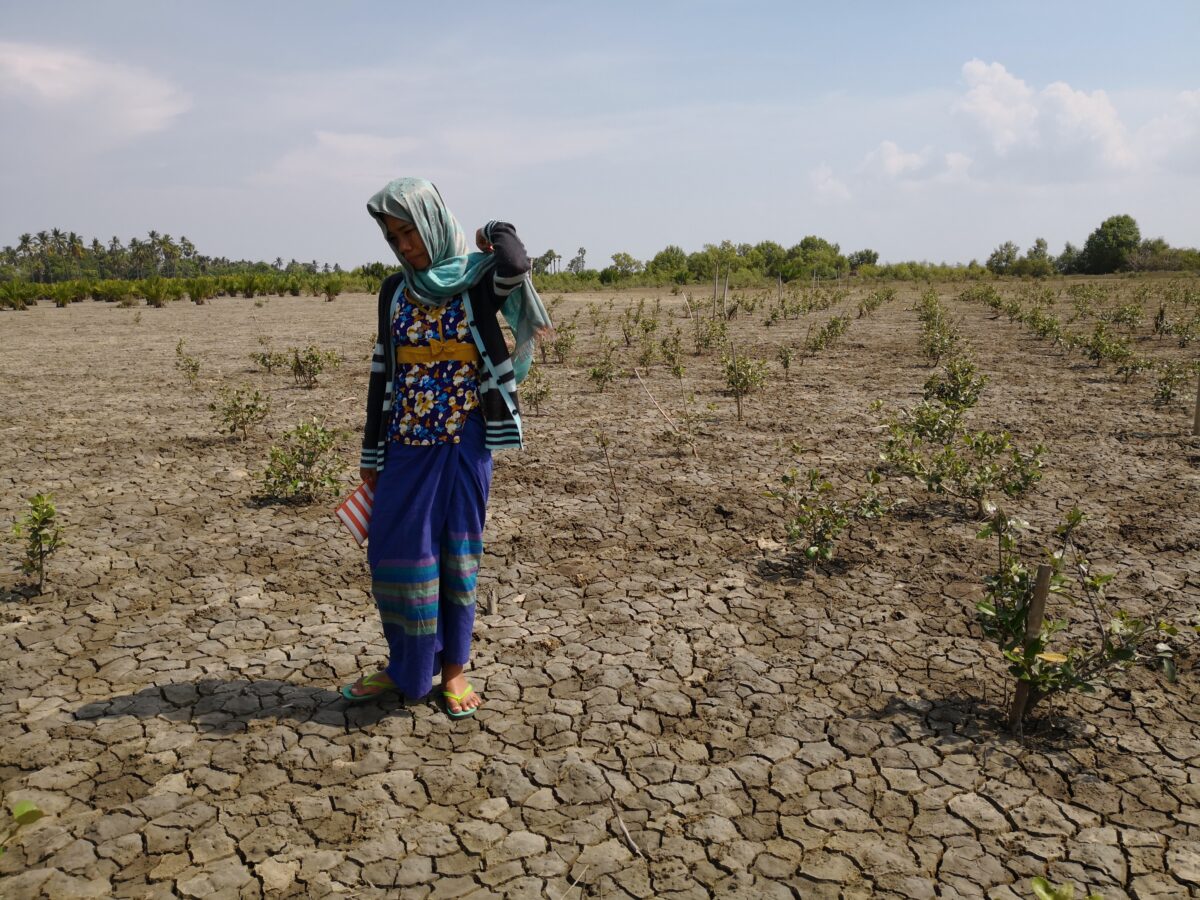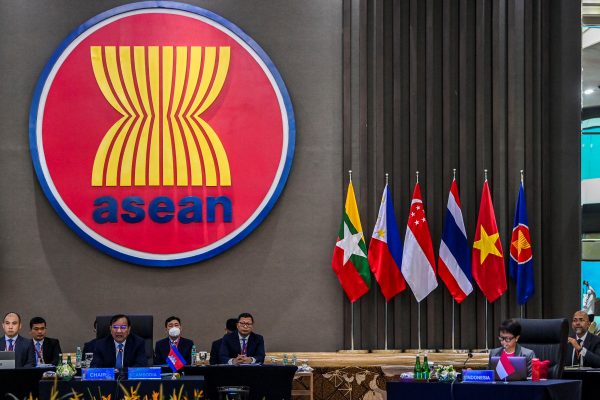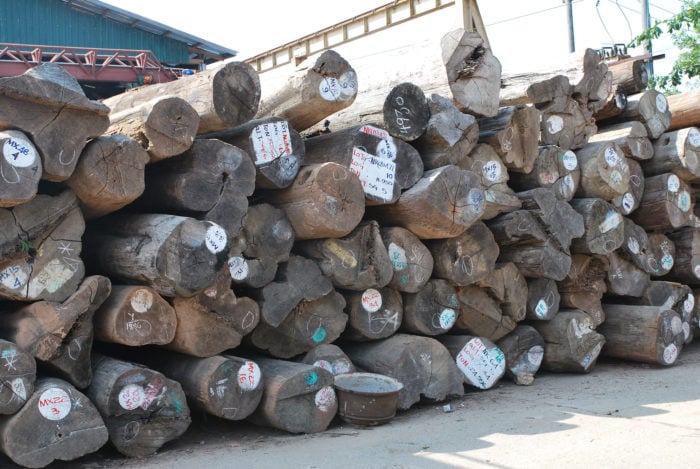On November 13, as country delegates at the UN climate summit in Egypt, known as COP27, continued their negotiations, Duwa Lashi La, the acting president of the National Unity Government (NUG), Myanmar’s parallel administration, sent a letter to the meeting reaffirming its commitment to reduce climate-warming emissions.
He added that the NUG was working with the people and ethnic resistance forces to protect the environment and lamented the military junta’s unchecked exploitation of the country’s natural resources, which he said has led to flooding and landslides.
On that same day, Khin Maung Yi, the junta-appointed minister of natural resources and environment, toured a protected forest in central Myanmar, inspecting tamarind seedlings and a 20-acre eucalyptus plantation. A small, grainy picture showed a group of masked men in slacks and light-colored shirts looking intently at a signboard.
I trawled through his ministry’s website to see if the coup regime had anything to say about COP27 or the upcoming biodiversity negotiations. What I found instead made me feel like I had entered the twilight zone.
In the “News” section, pages upon pages were devoted to the minister and his deputy in various stiff poses, inspecting factories and plantations or attending meetings. There were also copious updates on the well-being of a white baby elephant born in July.
Myanmar’s successive military leaders have been obsessed with these animals, which were seen as symbols of power and good fortune back in the days of absolute monarchy.
The closest to real news I found were announcements of protected forest areas. Nothing on this year’s most important climate and biodiversity discussions. It also seems the coup regime did not send any delegation this year, even though Myanmar is a party to the climate change convention under which the Egypt meeting was held.
It was unclear whether this was due to a lack of interest or because they were snubbed, like last year.
These two divergent approaches were yet another telling instance of the chasm between the NUG and the junta when it comes to taking climate change seriously.
No end in sight
With a long coastline, low-lying cropping areas and a poor population, Myanmar is highly vulnerable to climate change. It is also one of the countries least equipped to improve its resilience without outside help.
Its people are already suffering from an increase in the prevalence of drought and the intensity and frequency of storms.
Myanmar is where the interconnectivity of climate change, biodiversity loss, conflicts and hunger are playing out right before our eyes.
Yet the military junta, which seized power in a coup in February 2021, is more interested in holding on to whatever little vestige of power it still has, instead of preparing the Southeast Asian nation – and its future generations – to deal with climate impacts.
Despite a long history of conflict driven by natural resource extraction, the military continues to wreck the environment, focusing on short-term gains that come from mining mineral deposits, cutting down trees and polluting the air and waterways.
Myself and others have written about the worsening environmental situation and increased threats green activists are facing.
The persistent and brutal raiding and torching of farming communities in many parts of the country also add to the already dire food insecurity situation plaguing ordinary people.
The junta’s new rules to regulate local and foreign non-governmental organizations are likely to worsen the situation, by including criminal penalties for those who fail to comply.
After nearly two years of such tactics, all the military has succeeded in doing is raising a new generation of anti-junta activists willing to take up arms against a much-better armed but roundly-disliked enemy and pouring gasoline on a conflict that shows no signs of dying down.
Brain drain
I have also witnessed a massive outflow of people from Myanmar over the past 22 months. A vast number of friends and acquaintances, particularly the young and educated, have left, albeit unwillingly.
These were people who were helping to rebuild the country – people any country would welcome to be part of their workforce.
This is not only a drain on society and the economy. It also makes the country much less resilient to future climate impacts, just when the need for such resilience is becoming more and more important.
Let’s be honest though. All the terrible things the junta is doing does not mean all was rosy under the National League for Democracy (NLD), which ruled the country from 2016 to 2020.
The civilian government failed to effectively regulate the environmentally-destructive, corrupt and deadly jade business in the country’s north, made little progress on improving land governance or halted rampant land grabs, and neglected the voices of indigenous people.
In fact, critics say Myanmar’s Nationally Determined Contributions (NDC) – a document that outlines how countries are going to cut emissions – prepared by the NLD government but submitted post-coup by the military and signed by Khin Maung Yi, prioritizes big development and does not address the drivers of deforestation or decades of conflict.
Civil society space was shrinking too. This is reflected in a report that reviewed the progress of global anti-poverty goals, known as the Sustainable Development Goals (SDGs). Although the report was published in June this year, much of the data is from the years before the coup.
It showed that while Myanmar was facing major challenges in a majority of the goals, the only one where the score was worsening was under “Peace, Justice and Strong Institutions.”
Opportunity for the NUG
But some things were going in the right direction. Four out of 17 SDGs – climate action, education, reducing inequalities and responsible consumption and production – were on track on maintaining achievement. We can only imagine how much these trends have reversed by now.
The NUG needs to learn from the mistakes of the NLD and go further in building a green and inclusive government.
Only a few days ago, the International Institute for Democracy and Electoral Assistance (IDEA) released a policy paper on Myanmar’s climate and environmental challenges. The paper showed the path the NUG could follow.
Foremost among its recommendations for interim governance institutions, which included the NUG, was to inform, consult and include in decision-making, people of all genders and socio-economic groups.
Access to environmental information, public participation in environmental decision making and access to justice should be part of Myanmar’s commitments, it said.
“Inclusive decision-making and governance processes will need to address the historical patterns of exclusion of ethnic minorities, youth and women in natural resource governance and/or previous peace processes,” the paper added.
This is an opportunity for the NUG to tell the international community that if the world is serious about building climate resilience in Myanmar and protecting its rich biodiversity, democracy and respect for human rights are prerequisites.
The longer ASEAN turns a blind eye to the junta’s excesses, and the longer powerful nations outsource to them the difficult but necessary work of sanctioning the junta, the further Myanmar will be from crucial actions to save the planet.





